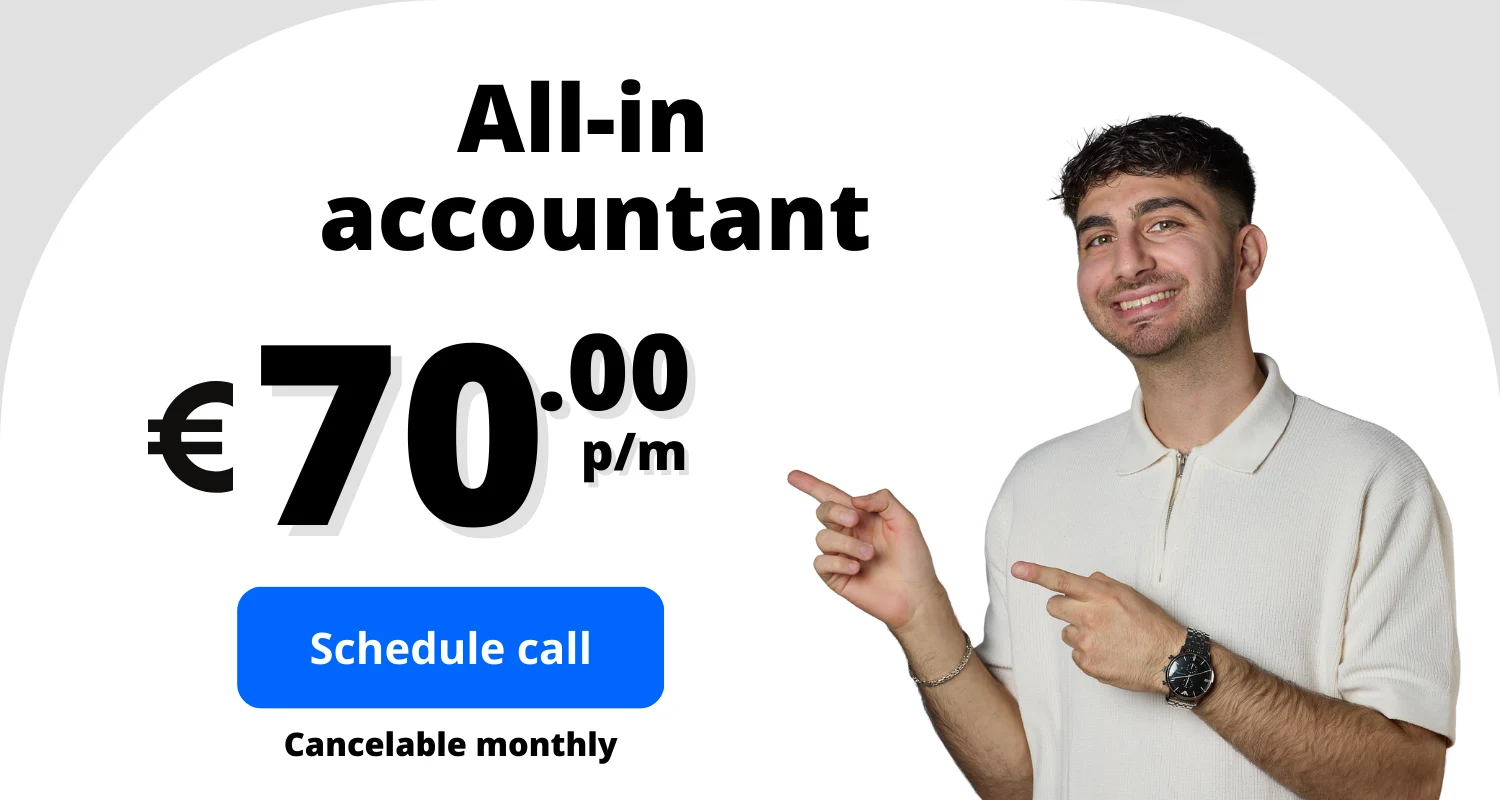Tax liability as a self-employed person
If you work as a self-employed person, you are almost always liable for VAT, unless you carry out exempt activities or fall under the small business allowance (KOR) scheme. For income tax, it depends on whether the tax authorities see you as an entrepreneur. If you meet their criteria, you can make use of deductions such as the self-employed deduction. But even if you don't get this status, you have to pay tax on your profits. You just can't apply any entrepreneurial deductions then.
What is VAT?
You charge sales tax, or VAT, on top of your selling price to customers. You pay this VAT to the tax authorities. What you pay yourself in VAT on business expenses, you can usually reclaim. In this way, VAT works as a kind of pass-through mechanism: you collect it for the government.
VAT rates
The standard rate is 21%. For some services or products, 9% applies, such as food or hairdressing services. Do you supply internationally? Then 0% may apply. Certain industries, such as education or healthcare, are completely exempt from VAT.
You can find the most up-to-date information on the Tax Office website - VAT rates.
VAT return
You usually file quarterly returns. In doing so, you indicate how much VAT you received from customers and how much you paid on your business expenses. You pay the difference or get a refund. Sometimes you have to file monthly or annual returns, depending on your situation.
KOR scheme
Do you earn less than €20,000 in turnover per year? Then you can opt for the small business scheme (KOR). You then do not have to charge or declare VAT, but you also cannot reclaim VAT on expenses. This scheme is particularly useful if you sell a lot to private individuals.
What is income tax?
The income tax return you pay on your company profits. If you work with a sole proprietorship or vof, those profits fall in box 1 of your personal tax return. Whether you count as an entrepreneur is determined by the tax authorities based on factors such as independence, risk and turnover.
Entrepreneur for income tax purposes
The Inland Revenue looks at things like: do you set your own rate and working methods? Do you run entrepreneurial risk? Do you have several clients and are you actively building your business? If you meet these requirements, you will be given entrepreneurial status and you can make use of deductions. You can check this on the website of the tax office - The entrepreneur check.
Pricing
Income tax has an increasing rate. In 2026, you pay 35.75% on the first €38,883 profit, 37.56% on the part up to €78,426 and 49.5% on everything above that. Because of deductions, your final tax is often lower, especially in the first few years as a self-employed person.
Deductions
As an entrepreneur, you can make use of various deductions. These are tax schemes that allow you to deduct part of your profits before paying taxes. Their purpose is to stimulate entrepreneurship, especially in the early years when you invest a lot or do not yet have a stable income. These deductions mean you pay less income tax and keep more to reinvest or set aside.
As an entrepreneur, you may use:
- Self-employment deduction (€1,200 in 2026, for a minimum of 1,225 hours of self-employment per year)
- Start-up deduction (€2,123, max. 3 times in the first 5 years)
- SME profit exemption (12.7% of profit after entrepreneurial deduction)
Read more here in our extensive article on all smart deductions.
Calculating tax as a self-employed person
How much you have to pay depends on your figures. But broadly speaking, it works like this:
VAT
Add up the VAT you received from customers and subtract the VAT you paid on business expenses. You either remit the difference to the Tax Office or get a refund. Example: you receive €2,100 and pay €1,050, then you remit €1,050.
Income Tax
You first determine your profit: turnover minus business expenses. Then you deduct the entrepreneur deduction and SME profit exemption (if you qualify for them). You pay tax on the remaining amount according to the tax rate. The tax credits are then deducted from this. You pay the net remaining tax to the tax authorities. To this is added the Zvw contribution (in 2026: 4.85% on part of your profit).
Difference between sales tax and income tax
You pay sales tax (VAT) on your turnover, income tax on your profit. With VAT, you are a conduit: you collect it from your customer and remit it. Income tax comes out of your pocket, but you can reduce it with deductions. You usually declare VAT quarterly, income tax annually.
Section | Sales tax (VAT) | Income Tax |
What are you paying over? | About what you sell to customers | On the profit you are left with after deducting your expenses |
Pricing | Usually 21%, sometimes 9% or 0%, or exempt for some professions | Ascending: 35.75% to €38,883, 37.56% to €78,426, above that 49.5%. |
When to declare? | Usually quarterly (sometimes monthly or annually) | Once a year via your income tax return |
Who pays? | Your customer pays the VAT, you remit it to the tax authorities | Yourself, out of your profits |
Benefits for you? | Small business scheme (KOR) if you have low turnover | Entrepreneurial deductions, SME profit exemption and tax credits |
How much tax do you pay as a zzp?
It depends on your profit, deductions and whether you fall under the KOR. With low profits, you often pay little or no income tax. Just starting out? Then you have an extra advantage thanks to the starter's deduction. If you make a lot of profit, you will have to pay the higher rates. You have to pay VAT anyway, unless you are exempt. Many entrepreneurs set aside about a third of their profits for tax and 100% of the VAT they receive, so they don't get any surprises.
Frequently Asked Questions
What tax do you pay as a self-employed person?
You pay sales tax on your turnover and income tax on your profit. There is also the Zvw contribution.
What is the difference between income tax and sales tax?
You pay sales tax on your turnover (VAT), income tax on your profit. VAT you pay indirectly, income tax comes out of your own profit.
How much tax do you pay as a zzp?
This varies from one situation to another. Due to deductions, you often pay less than the nominal rate. As a rule of thumb, you can set aside 30% to 40% of your earnings.
How much tax do you pay as a zzp first 3 years?
In your first few years, you benefit from start-up deductions and self-employment deductions. As a result, you often pay little or no income tax, especially with low profits.
What percentage should you keep aside?
Reserve about 1/3 of your profit for income tax and Zvw. For VAT: set aside all VAT received immediately.






